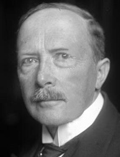Educated as jurist, Walter Simons served as a member of the provincial law court in Kiel (1905). In 1905 he received a job in the Reich justice ministry in Berlin. In 1911 Simons was transferred to the Law Department of the ministry for foreign affairs and took part in the negotiations at Brest-Litovsk and Bucharest (1918). After a short term of service at the Reich chancellery, Simons was appointed head of the foreign ministry's Law Department (December 1918) and led a German delegation at the peace negotiations in Versailles (1919). He resigned after protesting against the conditions proposed by the Allies and became president of the Association for German Industry (1919-1920). Simons returned to the state politics as foreign minister (24 Jun 1920 - 10 May 1921) in the Cabinet of Konstantin Fehrenbach. Afterwards he was President of the German Supreme Court (Reichsgericht) in 1922-1929. When President Friedrich Ebert died on 28 Feb 1925, the Reichstag enacted the Law on Acting for the Reich President (adopted 10 Mar 1925, effective 11 Mar 1925), which made Simons acting head of state until the installation of a new president. The election of 26 Apr 1925 brought victory to Paul von Hindenburg, who was sworn in on 12 May 1925. Simons also taught law at the University of Leipzig from 1928. Biography source: [4] |

